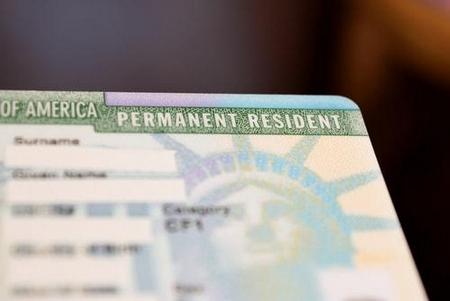Recent Blog Posts
Can I Sponsor Relatives for Employment-Based Immigration?
 Do you have family members in another country who would like to immigrate to the US? If you are a US citizen and own a business, you should consider the possibility of sponsoring your relatives for an employment-based immigration visa. The wait times can be much shorter for employment-based (EB) visas than for family preference (F) visas, and you can sponsor more distant relatives for an EB visa than you can for an F visa.
Do you have family members in another country who would like to immigrate to the US? If you are a US citizen and own a business, you should consider the possibility of sponsoring your relatives for an employment-based immigration visa. The wait times can be much shorter for employment-based (EB) visas than for family preference (F) visas, and you can sponsor more distant relatives for an EB visa than you can for an F visa.
Limitations on Family-Based Immigration Visas
There are no annual quotas for immediate relative (IR) visas, but these are only available to a U.S. citizen’s spouse, parent, or unmarried child under age 21. There are quotas, and often substantial waiting lines, for family preference (F) visas, which are available for adult children and siblings. The wait times for family preference visas can be five, 10, or even 15 years, no matter what country your relatives are coming from. And you cannot sponsor a cousin, nephew, or aunt for a family-based immigration visa at all.
When Children Fight the Parenting Time (Visitation) Schedule

Sticking to a consistent parenting time schedule may take a lot of effort on your part, but experts agree that having a predictable routine helps children feel more secure and confident. At some point, however, almost every child will put up a fuss when they have to pack up and shift to their other parent’s home. It is natural for a parent to feel conflicted in this situation. On one hand, you hate to do anything that creates undue stress for your child. On the other hand, if you do not comply with your parenting time order, you could be penalized by the court.
So, what should you do if your child strongly objects to going with their other parent when the parenting time schedule calls for it? There are several factors to consider, including the law, the age of the child and the behavior of the co-parent.
The law. When you have a court-approved parenting plan, you must make a child available to the other parent as scheduled and encourage the child to go. If your co-parent believes you are refusing to comply with the plan, they can file a court petition for the enforcement of allocated parenting time (750 ILCS 5/607.5). In addition to being required to give “make-up time” to your co-parent, you could be ordered to participate in counseling at your own expense, pay your co-parent’s legal and other expenses, and/or pay a fine to the court.
How to Deal With a Brain Injury After an Illinois Car Accident
Millions of car accidents are reported to police each year and range in severity from property damage only to fatal accidents. According to the National Highway Traffic Safety Administration (NHTSA), there were nearly 6.5 million police-reported traffic crashes in 2017. While the majority of them were property-damage-only crashes, there were nearly 2 million crashes involving injuries and more than 34,000 fatal crashes.
One of the most serious injuries you can suffer when you are in a car accident is a brain injury. The brain is arguably the most important organ in your body because it controls all of your bodily functions. Injuring this organ can result in long-term or even permanent impairment to both your physical and mental states. Suffering a brain injury from a car accident may entitle you to financial compensation if the crash was someone else’s fault.
International Students Must Beware of Visa Violations and Scams
 Media coverage sometimes denigrates the enforcement actions taken by U.S. immigration authorities, calling them overly aggressive or harmful to families. Yet if agencies like Immigration and Customs Enforcement (ICE) did not actively seek to capture and punish those who violate U.S. criminal laws and immigration laws, the U.S. could not maintain the public safety and homeland security that the citizens and lawful residents of the nation expect and deserve. Deportation and removal actions are an unpleasant but necessary reality.
Media coverage sometimes denigrates the enforcement actions taken by U.S. immigration authorities, calling them overly aggressive or harmful to families. Yet if agencies like Immigration and Customs Enforcement (ICE) did not actively seek to capture and punish those who violate U.S. criminal laws and immigration laws, the U.S. could not maintain the public safety and homeland security that the citizens and lawful residents of the nation expect and deserve. Deportation and removal actions are an unpleasant but necessary reality.
That said, U.S. immigration law is complex and often intimidating. There are many unexpected ways that foreign citizens wishing to live in the U.S. can run afoul of the law.
Young people hoping to advance in life are particularly at risk of being taken lured into fraudulent immigration schemes. The skill of an experienced immigration attorney is often necessary to help holders of student visas to stay out of trouble with U.S. immigration officials.
What Are Some Common Financial Divorce Mistakes to Avoid?

Going through a divorce can be emotionally devastating, to the point that you feel depressed, anxious, and have difficulty concentrating. When your mind is not functioning properly, you may make mistakes that you will later regret. Here are some common divorce mistakes to watch out for.
-
Relying on the wrong advice. Your recently-divorced cousin in Texas and your twice-divorced aunt in Indiana may have all kinds of advice for you. But the divorce laws in those states are different than the laws in Illinois. Listen to your local lawyer when it comes to matters of the law and the court procedures in your county. You may also want to consult a certified public accountant or certified divorce financial analyst to help you with financial projections and tax implications.
-
Keeping the house without understanding all associated costs. You may love your home and neighborhood, or just not want the hassle of moving. But before you agree to keep your marital home, make sure you create a budget that includes all of the home’s expenses, including the mortgage, property taxes, insurance, lawn mowing, snow removal, and other maintenance expenses. Consider the age of all of the appliances and what it will cost you to repair or replace them if they break. Do not keep the home unless you are sure you will be able to afford it.
What Should I Do if I Am in an Accident With an Uninsured Motorist?
Picture this: You are in your car, stopped at a red light. The light turns green, so you hit the gas, but all of a sudden, a car running a red light comes out of nowhere and slams into the side of your vehicle. You put your hazard lights on and get out of your vehicle, trying to assess any damage to you or your car. You talk to the other driver and ask for their insurance information, but the other driver does not have insurance. What do you do in a situation like this?
Uninsured motorist collisions happen more often than you might think. According to the latest data available from the Insurance Information Institute, approximately 13 percent, or one in eight, motorists were uninsured in the United States in 2015. Even if a person has insurance, his or her coverage might not fully cover the costs of the damages sustained in an accident. If you are involved in an accident with an uninsured or underinsured motorist, here are a few tips to follow:
2019 Update on DACA - Deferred Action for Childhood Arrivals
Over 700,000 people who illegally entered the U.S. prior to June 2007 and prior to age 16 have been allowed to remain in the U.S. under the Deferred Action for Childhood Arrivals (DACA) program. DACA began offering two-year deferrals of removal to these people in 2012 with the option of renewal every two years. Since the program was ended by executive order in 2017 and then resumed by federal court orders in early 2018, many people on DACA status have been in limbo, wondering whether they may lose their DACA status and be deported.
Numerous lawsuits have been filed in various federal district courts seeking to keep the DACA program alive. Two district courts have ordered USCIS to accept DACA renewals, and USCIS has complied with these orders on a nationwide basis. However, a decision by the U.S. Supreme Court may be necessary to determine the ultimate fate of the DACA program. At this time, a Supreme Court ruling is not expected until the first quarter of 2020 at the earliest.
When Is a Guardian Ad Litem Used in a Child Custody / Parenting Dispute?
 When parents with minor children divorce in Illinois, the court asks them to submit a mutually agreed parenting plan that includes an allocation of parenting time and decision-making responsibility. The court will approve that plan as long as it appears to be in the best interests of the children. However, if the parents cannot agree, the court will have to determine the parenting plan. To ensure that the court has enough information to make decisions in the best interests of the children, the court may appoint a guardian ad litem (GAL) to conduct an investigation and report back to the court. A parent may also ask the court to appoint a GAL if they believe that the court needs to hear an independent perspective on certain matters, e.g., a child’s special needs or the fitness of a parent to care for a child.
When parents with minor children divorce in Illinois, the court asks them to submit a mutually agreed parenting plan that includes an allocation of parenting time and decision-making responsibility. The court will approve that plan as long as it appears to be in the best interests of the children. However, if the parents cannot agree, the court will have to determine the parenting plan. To ensure that the court has enough information to make decisions in the best interests of the children, the court may appoint a guardian ad litem (GAL) to conduct an investigation and report back to the court. A parent may also ask the court to appoint a GAL if they believe that the court needs to hear an independent perspective on certain matters, e.g., a child’s special needs or the fitness of a parent to care for a child.
What Does a Guardian Ad Litem Do in an Illinois Divorce Case?
How Can I Change My Illinois Parenting Time Schedule?
 When parents of young children get divorced in Illinois, they must file a parenting plan with the court that includes a parenting time formula or schedule with sufficient detail to enable court enforcement. Thereafter, if either parent wants to change the parenting time schedule, they can do so at any time by either making an informal agreement between themselves or going back to court to formally request a parenting time modification.
When parents of young children get divorced in Illinois, they must file a parenting plan with the court that includes a parenting time formula or schedule with sufficient detail to enable court enforcement. Thereafter, if either parent wants to change the parenting time schedule, they can do so at any time by either making an informal agreement between themselves or going back to court to formally request a parenting time modification.
The Illinois Supreme Court has published a standard Parenting Plan form designed to ease the process of defining and modifying a parenting time schedule. This form spells out a reasonable process for changing your parenting time schedule.
Modifying Parenting Time by Agreement
For example, suppose you originally agreed to a schedule that designated Halloween as a holiday on which each parent would have the children every other year. However, you would prefer not to treat Halloween as a holiday anymore and instead treat it like a regular day.
The U Visa Program: From Crime Victim to Green Card
 We sincerely hope that you have not been a victim of a crime while temporarily visiting, studying, or working in the United States. But if you have, you should be aware of the immigration benefits available to crime victims under the nonimmigrant U visa program.
We sincerely hope that you have not been a victim of a crime while temporarily visiting, studying, or working in the United States. But if you have, you should be aware of the immigration benefits available to crime victims under the nonimmigrant U visa program.
How to Qualify for a U Visa as a Crime Victim
To qualify for a U nonimmigrant visa, you must meet the following criteria:
- You were the victim of a qualifying crime, as a result of which you suffered substantial mental or physical abuse.
- You possess information about the crime that would be helpful to law enforcement.
- A federal, state, or local law enforcement official certifies, on a form that is attached to your visa application, that you are helping or have helped law enforcement in the investigation or prosecution of that crime.
- You must meet the standard criteria for admissibility to the US or obtain a waiver of inadmissibility.
 English,
English,
 Spanish,
Spanish,
 Polish,
Polish,
 Urdu
Urdu















 Make a Payment
Make a Payment



